

|
 |
Thick as Thieves (TV)
R2 - United Kingdom - Network Review written by and copyright: Paul Lewis (8th February 2009). |
|
The Show
 Masters of the bittersweet situation comedy, writers Dick Clement and Ian La Frenais are responsible for some of the best-loved British television sitcoms, including The Likely Lads (1964-6), Whatever Happened to the Likely Lads? (1973-4) and Porridge (1974-7). In 1973, Clement and La Frenais were approached to write two episodes of Seven of One, the BBC’s attempt to develop a solo vehicle for Ronnie Barker after seducing the comedy star away from London Weekend Television. Utilising the same anthology approach as Barker’s earlier series The Ronnie Barker Playhouse (Rediffusion, 1968) and Six Dates With Barker (LWT, 1971), each episode of Seven of One focused on a different situation. Clement and La Frenais contributed two scripts to the series. ‘I’ll Fly You For a Quid’ saw Barker playing Evan Owen, a compulsive gambler who tries to develop a plan to retrieve the winning betting slip that has been accidentally sealed inside the coffin of a dead relative. Clement and La Frenais’ other script for the series, ‘Prisoner and Escort’, focused on the relationship between convicted criminal Norman Stanley Fletcher (Ronnie Barker) and his escorts to Slade Prison, Prison Officers Barrowclough (Brian Wilde) and MacKay (Fulton MacKay). The positive reception that greeted ‘Prisoner and Escort’ led the BBC to commission Porridge, which followed Fletcher’s adventures inside Slade Prison. 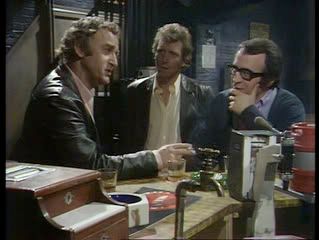 According to the executive producer of Seven of One, Jimmy Gilbert, the series was devised as ‘a way of finding a situation comedy for Ronnie Barker’ (Gilbert, quoted in Webber, Clement & La Frenais, 2002: 4). Whilst working on Six Dates With Barker, Barker had already considered proposing a sitcom set inside a prison (ibid.). Barker’s idea was less bittersweet than Clement and La Frenais’ approach to the subject matter: ‘my idea was much more frivolous […] like Bilko in prison: smuggling women in, that sort of thing’ (Barker, quoted in ibid.). However, Barker respected Clement and La Frenais’ more ‘realistic’ approach: ‘It was definitely the best way to go because my idea would have been geared much more to laughs, whereas theirs possessed more bite’ (Barker, quoted in ibid.: 5). However, during the writing of ‘Prisoner and Escort’ Clement and La Frenais ‘started writing […] and found we couldn’t stop’ (Dick Clement, quoted in ibid.). Instead of writing just one episode, they discovered that ‘before we knew it we’d written an entire series’ (Clement, quoted in ibid.). The focus of the scripts they had written were different from the prison-set situation comedy that they had been asked to write: ‘It wasn’t about a guy in prison, but about someone who’d just come out only to find his wife was having an affair with his best friend. Before long, we had written about fifty pages based on the situation’ (Clement, quoted in ibid.). Clement and La Frenais ‘envisaged Ronnie being the ex-prisoner’, but ‘[a]s we knew we had an entire series here, we put it aside’ and carried on with the scripting of ‘Prisoner and Escort’ (Clement, quoted in ibid.). Clement and La Frenais reworked the script they had written about the released prisoner and his home problems; giving the series the title of Thick as Thieves, they sold the scripts to LWT. Broadcast on ITV in 1974, Thick as Thieves starred Bob Hoskins as petty criminal George Dobbs, Pat Ashton as Dobbs’ wife Annie and John Thaw as Dobbs’ friend Stan. (In 1978, Clement and La Frenais took a different approach to similar subject matter in the BBC’s series Going Straight, which once again starred Ronnie Barker as Norman Stanley Fletcher who, following his release from Slade Prison, attempts to ‘go straight’.) As with Whatever Happened to the Likely Lads?, each episode of Thick as Thieves opens with a song whose lyrics were penned by Ian La Frenais. As in the theme tune for Whatever Happened to the Likely Lads?, La Frenais’ lyrics for Thick as Thieves’ opening song highlight the theme of social change and issues of ‘making do’ and doing ‘the best we can’ in difficult circumstances; as outlined below, these are themes that run throughout Clement and La Frenais’ work. La Frenais’ lyrics tell us that ‘Some of us are like most of us We do the best we can. We make ends meet and we live on the streets Where they’re pullin’ the houses down, down, down. Life just makin’ do, my love We just have to see it through, my love. And if we have to live like two, my love We’ll do the best we can’. 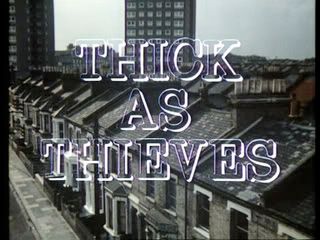 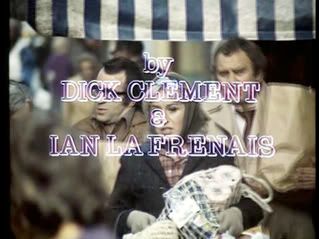 Accompanied by this song, Thick as Thieves’ title sequence (like the titles sequence for Whatever Happened to the Likely Lads?) juxtaposes the old (rows of Victorian terraces) and the new (the modern, somewhat inhuman, tower blocks that were created in the 1960s): the credits play out over shots of the new, then-modern blocks of flats towering over traditional Victorian terraces, which are in the process of being torn down. The first shot in this sequence is a long shot depicting a row of Victorian terraces stretching into the distance, two modern tower blocks rising above them. A cut takes place, to a mid-shot of George, Annie and Stan walking side by side down a busy street, carrying bags of shopping. In a long shot, two men tear down what is left of one of the partially-demolished terraces, presumably to make way for a new, impersonal block of flats; rubble is strewn in the space between the foreground of the frame and what is left of the terrace, and a fire burns in the bottom right hand corner of the frame. (At this point, the theme song declares that ‘we live on the streets/Where they’re pullin’ the houses down, down, down’.) A modern tower block is shown in a low-angle shot, and tilting down the height of the building the camera reveals George, Annie and Stan sitting on the wall that circles the block of flats. The trio gaze up at the building and then solemnly look down. George kisses Annie on the cheek; Stan responds by giving Annie a peck on the other cheek. In this sequence, the old values of community and solidarity (represented through the terraces) are shown to be at odds with the new impersonal culture, symbolised by the huge blocks of flats that tower over the old Victorian terraces. Since Dickens, social change has often been represented through architectural change; in the 1960s and 1970s, this idea was framed through the Situationists’ concept of psychogeography. From the outset of Thick as Thieves, the protagonists are shown to exist in a liminal state, in a culture that is on the threshold of change; this change is not only represented through the conflict between old and new dwellings but also in the Jules et Jim-style threesome that exists between George, Annie and Stan (see Dick Clement and Ian La Frenais’ comments on social change in Wickham, 2008: 15). 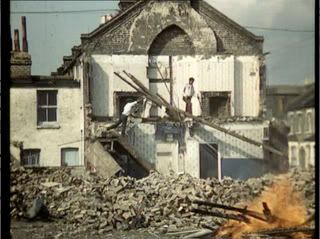 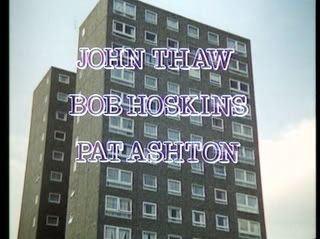 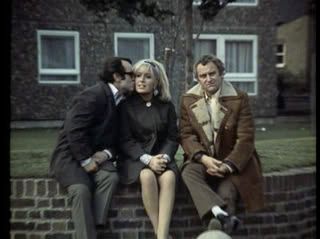 The images in this titles sequence highlight the show’s confrontation of the dichotomy between the past and the present: throughout the series, George reflects on the social changes that have taken place during his stretch ‘inside’. In the second episode, ‘Happy Release’, George reflects on the fact that whilst he has been in prison, his wife has taken a lover: ‘Look, we can’t go on like this, for God’s sake! Husband, wife and lover living under the same Fulham roof! I know the moral climate has changed since I’ve been inside; I know there’s been a breakdown in many social and sexual taboos. But I never thought I’d come home and find the permissive society alive and well and living at 57 Wickstead Street’. In a similar way, in Whatever Happened to the Likely Lads? Terry Collier (James Bolam) discovers, on his return from military service, that society has changed drastically; Collier finds himself in conflict with the new consumer-oriented aspirational lifestyle that has been embraced by his oldest friend, Bob Ferris (Rodney Bewes). Again, this conflict between the old and the new is represented through the series’ titles sequence, which depicts a montage ‘of the Tyneside docks and a grim, Victorian industrial panorama of bridges’, the ‘ruins’ of ‘old terrace back-to-backs in the process of demolition’, the rise of ‘new tower blocks on the horizon’ and the spread of suburban semis (Wickham, 2008: 3). Both George Dobbs and Terry Collier find themselves in a world where values have changed and in which they have been ‘left behind’. In his BFI monograph on The Likely Lads (2008), Phil Wickham notes that Clement and La Frenais’ work during this period is often focused on ‘the visible march of modernity transforming the landscape’ (26). Suggesting that that ‘Clement and La Frenais’ scripts are imbued with melancholy about the past and worries about the future’, Wickham defines Clement and La Frenais' comedy as ‘comedy that derives from the texture of everyday life; from banter with an old friend, from trying to get to work on time or impressing a girl, from social misunderstandings, from our own failures that keep dragging us down’ (ibid.: 9, 6). Taking their cue from the success of the British ‘new wave’ films such as Saturday Night and Sunday Morning (Karel Reisz, 1960) and Billy Liar (John Schlesinger, 1963), Clement and La Frenais (along with other sitcom writers such as Ray Galton and Alan Simpson) took comedy out of the drawing room and into everyday contexts (ibid.: 12-3). Their shows privileged the issues and problems relevant to the lives of working-class viewers, ‘offer[ing] a comic angle on the New Wave’s concerns’, from ‘the fear of settling down and of domesticity’, rebellion and ‘dreams of aspiration’; but ‘most of all there are the failed dreams and lack of confidence of Billy Liar’ (ibid.: 13, 14). This exploration of the theme of ‘failed dreams’ is highlighted in Thick as Thieves’ theme song and runs throughout the series, as George, Stan and Annie struggle to come to terms with the things that are not available to them. In the final episode, ‘Holy Deadlock’, George observes: ‘What have we got to show for what we’ve done all our lives? We don’t amount to nothing. No nice home, no car, no money in the bank, no possessions, no Premium Bonds’. ‘Maybe we ain’t been doing the right thing all these years’, Stan admits. The two men decide to ‘go straight’, but their need to provide for Annie leads them back to a life of crime; without revealing too much, the final sequence of the series reinforces the extent to which these men’s lives are defined by patterns of behaviour from which they cannot escape. As with Clement and La Frenais’ other situation comedies, although Thick as Thieves is very funny it is also very poignant; humour is balanced by pathos. 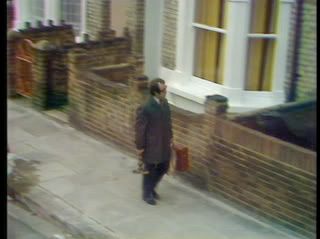 Another strength of the series is Clement and La Frenais’ ear for regional dialect, something which also strengthens their film scripts, such as their script for Villain (Michael Tuchner, 1971) and, more recently, The Bank Job (Roger Donaldson, 2008). Phil Wickham notes that in Clement and La Frenais’ work, ‘[t]here is empathy, a warmth in dealing with the characters they create, a curiosity in exploring aspects of everyday life and how it affects the soul – and of course a feel for dialogue, for the ebb and flow of conversation, particularly between men who don’t have power or real ownership over their own lives’ (ibid.: 20). Ian La Frenais has commented that his work with Dick Clement is characterised by ‘“natural speech” and “believability – it does come out of the characters”’ (La Frenais, quoted in ibid.: 19). Episodes: ‘The Homecoming’ (24:47) 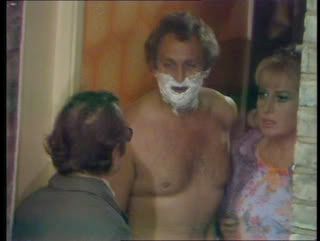
Upon his release from prison, burglar George Dobbs (Bob Hoskins) is met by a crowd of photographers. Dobbs poses for them but discovers that the photographers aren’t waiting for him; they’re there to document the release of a notorious West London villain, who nudges Dobbs out of the way. On his way home, Dobbs visits his local pub. The landlord tells Dobbs, ‘I thought you’d be out tomorrow’. ‘Yeah well’, Dobbs responds, ‘prisons is like ‘ospitals these days, aren’t they: needin’ the beds’. Dobbs returns home to find Stan (John Thaw), his best friend, answering his door, wearing nothing but a pair of pyjama bottoms and with his face covered in shaving foam. Later, Dobbs questions his wife Annie (Pat Ashton) as to why Stan answered the door ‘topless… and they was my pyjamas’. Annie reveals that she has been conducting an affair with Stan and that she and Stan are in love; offering George a cup of tea, she is met with Dobbs’ assertion that ‘That’s the universal remedy, is it? The British panacea to cure all ills. Kept us going through the war, smiling through the Blitz. “’Ave a cup of tea”. That’s supposed to wipe this slate clean, is it; erase the bitter evidence of betrayal and deceit. {Then, lowering his voice.} Two sugars’. George and Stan try to sort out this ‘classic situation’, as George describes it: ‘lonely wife, distant husband, randy friend’. Stan is worried that George will try to get him ‘worked over’, but George asserts ‘What’s that gonna prove? How’s a few bruises going to alter the situation?’ When Stan injures himself falling down the stairs, Annie accuses George of assaulting his friend; George tells her that it’s simply a case of ‘Primitive justice, my love’. However, Stan is under doctor’s orders not to move and must stay in Annie’s bed; George and Stan must learn to live together. ‘Happy Release’ (25:00) 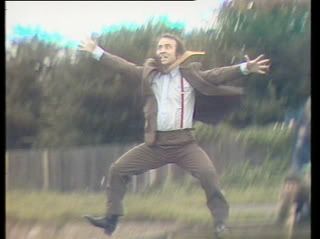
The next morning, Annie awakes and begins to prepare breakfast before George interrupts her by coming in to the house. ‘Where have you been?’, Annie asks him. George tells her, ‘I couldn’t sleep, could I [….] You can’t stretch out on that sofa. It’s freezing in that front room’. Whilst Annie cooks Stan’s breakfast, George confesses that he considered committing suicide by jumping into the Thames. Annie barks at him: ‘Jumping in? You can hardly swim’. George reminds her, ‘That’s an advantage in the drowning stakes’. Annie tells George that whilst he has been in prison, the area ‘has changed, you know […] Only yesterday the milkman got mugged. I had to open a tin of carnation’. Annie orders George to take Stan’s breakfast upstairs; in the bedroom, Stan waxes lyrical about his relationship with Annie, ‘What Annie and I have is a many splendored thing’. Bitterly, George comments that ‘What Annie and me had weren’t ‘alf a bad thing. Okay, it maybe lacks a bit of splendour, and it weren’t so much decreed in ‘eaven as in Fulham registry office; but we was doin’ alright until you come along and cocked it up’. Later, George returns home to find the supposedly bed-ridden Stan wandering about the house: ‘So you’d have no trouble transporting yourself out of here’, George asserts. However, when Annie returns and they discuss the living situation, George is despondent to find that Annie is adamant that George must find somewhere else to live. Wandering the streets, George spots a boy who is in trouble after falling into a river. George dives into the water to rescue the boy and, when he is returned home by an ambulance, finds himself having to share a bed with the still-bedridden Stan. Both Stan and George are kept awake by a cat who, in Stan’s words, is ‘always up there, flaunting his sexual conquests on our roof’. ‘Good Conduct’ (24:18) 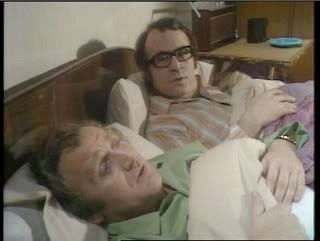
An alarm clock goes off. Thinking ‘he’s back in the nick’, a disoriented George jumps out of bed and starts shouting incoherently. Stan declares that George’s behaviour is ‘Pavlovian. Is that the word?’ George tells Stan that he ‘thought that some of the lads had gone over the top’ before asking, ‘What’s an alarm clock doing in this house? You never got up for a day’s work in your life’. Reflecting on George’s instinctive response to the sound of the alarm clock, Stan and George both concede that ‘it takes a long time to get stir out of your system’. A policeman visits George. George assumes that the police are going to accuse him of committing another crime. The policeman declares that ‘You only have to sniff a copper and your reflexes are…’, but is interrupted by Stan, who finishes the other man’s sentence with his new favourite adjective, ‘Pavlovian?’ The policeman reveals that he has visited George in order to persuade him to pose for a picture, following his attempt to rescue the boy who fell into the river. ‘Not too much fuss, though, eh’, George asserts. The policeman declares sarcastically, ‘I’ll cancel the motorcade and the march past’. Stan tells George, ‘I’ve had my picture in the paper’. However, George asserts, ‘Not as a hero, you haven’t. When you had your picture in the paper, what was the caption? “Have you seen this man”’. Later, the policeman returns to George’s house and reveals that the boy’s family have been burgled. ‘What sort of person would do a thing like that?’, George bemoans. ‘Your sort of person, as it happens’, the policeman tells George, before accusing him of masterminding the burglary and using Stan as the conduit for his criminal behaviour. However, George is vindicated when the mayor invites him for a meal to celebrate his act of bravery. ‘Two Men in My Life’ (26:02) 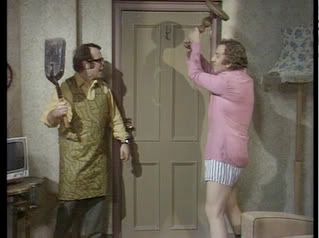
George and Stan are enjoying a ‘lock-in’ at their local pub. There, they discover (through the local paper) that their old associate Tommy Hollister (Trevor Peacock) has escaped from prison. Returning home late, George and Stan are given the ‘cold shoulder’ by Annie: ‘I presume you must have found some diversion for the last four hours’, she protests. George and Stan try to form excuses for being so late to return home. ‘Hasn’t taken you long to fall under his influence, has it?’, Annie tells Stan; ‘How can you go down to that Spotlight Club? It’s a breeding ground for criminals’. ‘But we are criminals’, Stan protests. Annie complains that Stan and George are not paying their way: ‘there are two men in my life. To one I am a lover; to the other I’m a wife… And I give both of them my best, and get nothing bleedin’ back’. Annie leaves George and Stan; George and Stan struggle to care for themselves. Whilst taking care of the household chores, they hear footsteps upstairs. Thinking they’re being burgled, they prepare to clobber the intruder but discover that it’s none other than the escaped convict Tommy Hollister, who seeks to use George’s house as a hideout. However, things become even more complicated when Annie returns. ‘The Trouble With Tommy’ (24:43) 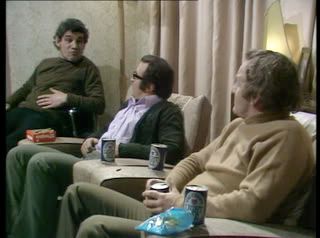
Tommy is still hiding out in George’s house, and the police are searching for him. George tries to persuade Tommy to flee the country: ‘You’re more than welcome here, but they said on the news that the Old Bill has narrowed the search to West London’. George and Stan try to find a way to gather enough money to send Tommy out of the country. Stan proposes doing ‘a job’, as ‘It’s no dodgier than shelterin’ him up there’. In an ice cream van, George and Stan stake out a house that they are planning to burgle. However, the ice cream van’s wiring is faulty and the chimes are accidentally turned on. Returning home, Stan advises Annie not to challenge Tommy: ‘He’s been deprived; all his “urges” have been sublimated’. Annie threatens to ‘tell the law’ that Tommy is hiding in George’s house. Meanwhile, George’s ‘job’, the attempted burglary of a television star’s house, doesn’t go quite as planned. However, on George’s return home, George, Stan and Annie discover that unbeknownst to them Tommy has indeed acquired the money he needs to flee the country and has left them in peace. ‘Three Into Two Won’t Go’ (23:55) 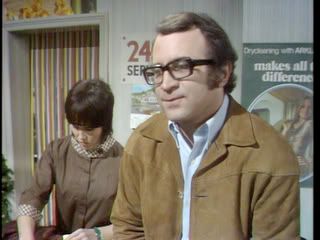
At the local laundrette, George discovers that whilst he has been in prison a younger friend has got married. Upon hearing the news, George suggests that his friend has rushed into marriage at a too young age, but the employee in the laundrette, Daphne (later revealed to be Annie’s best friend, played by Nell Curran), reminds George that he was the same age when he married Annie. George tells her that ‘Since then, we’ve had the permissive society, haven’t we? I mean, now there’s a lot more things to do, and a lot more people doin’ it an’ all’. Daphne discusses the ‘situation’ at George’s house and tells George that Stan and Annie are ‘going on holiday together’. George is unaware of this, but to save face he pretends that Stan and Annie have his blessing. When George returns home, he finds that Daphne’s revelation is confirmed by Stan and Annie, who tell George that they booked the holiday (to Benidorm) before George’s release from prison was confirmed. ‘We wouldn’t have had all this embarrassment if you hadn’t earned your full remission’, Stan tells him. ‘Oh, how inconsiderate of me and my parole board’, George barks sarcastically; ‘You see, I ‘ad no idea of your ‘oliday plans together. If I did, I could’ve beaten up a warder or incited a riot; sat on the roof, painting slogans and beatin’ my billycan’. However, when George makes plans to go on holiday with Daphne, Annie develops a sudden twinge of jealousy. The outcome is that Stan and George stay home whilst Daphne and Annie take the holiday to Benidorm. ‘Home and Away’ (24:31) 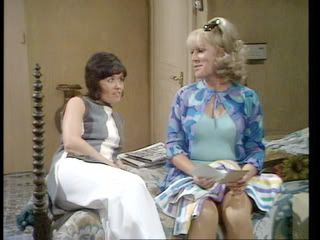
Daphne and Annie are on holiday together in Benidorm. Annie receives a letter from George and another from Stan, both offering wildly different versions of events back home. ‘Which one do you believe?’ Daphne asks her. ‘Neither’, Annie declares. Daphne tells Annie, ‘Sooner or later you’re going to have to choose between them’. In Fulham, George and Stan argue about Stan’s behaviour. ‘You’ve been with some bird’, George asserts. Showing George a pile of money, Stan tells George, ‘I’ve been playing Brag. Where do you think I got all that change?’ ‘You’ve probably done the poor girl’s gas meter’, George responds. In Annie’s absence, Stan ‘plays away’ with another woman; when Daphne returns alone, she reveals that Annie has met another man. George complains, ‘She’s got enough to choose from here’. However, Annie eventually decides to leave the promises offered to her by her new lover, and returns to Stan and George. ‘Holy Deadlock’ (23:42) 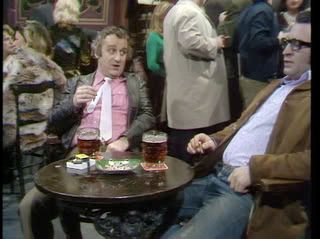
George has bought a stolen Japanese-made transistor radio and struggles to make it work. Stan tells George that the radio will never work, as it is only configured to pick up Japanese radio stations. However, Annie points out that solution is much more simple: George has forgotten to put a battery in the radio. George suggests to Stan that the situation (which Stan refers to as a ‘menagerie’ before George tells him, ‘Let’s not get sidetracked by your illiteracy’) needs to be resolved by one of the men asserting his ‘alpha male’ status: ‘I read a lot of books inside; it’s not all breaking rocks in Wandsworth’. George and Stan both decide to prove their suitability to provide for Annie by arranging ‘a job’, but they both end up unknowingly burgling the same flat.
Video
The series was shot on videotape. There is some tape distortion throughout the series, evident from the opening moments of the first episode. However, this is to be expected considering the age and relative rarity of these episodes; this is the first home video release of this series in the UK, and to the best of my knowledge the series has not been repeated on terrestrial television since its first broadcast in June/July, 1974. 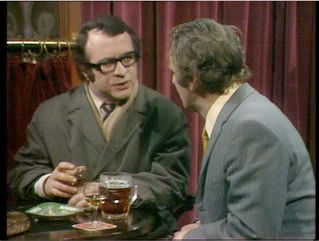 The original break bumpers are intact, and the series is presented in its original 4:3 aspect ratio.
Audio
Audio is presented via two-channel monophonic soundtrack, which is always clear and free from problems. There are no subtitles.
Extras
There is no contextual material.
Overall
Network’s release of Thick as Thieves is extremely welcome, filling a DVD-sized gap in the home video availability of Clement and La Frenais’ work and also offering an opportunity to see Bob Hoskins and John Thaw performing together in a situation comedy. Fans of Clement and La Frenais’ work on such shows as The Likely Lads and Porridge will find much to enjoy in Thick as Thieves, especially considering its till-now hard-to-see status; as outlined above, the series has much in common with Clement and La Frenais’ more famous (and more easily-available) BBC series Whatever Happened to the Likely Lads?, and the two series function quite well as companion pieces. As such, this release comes with a strong recommendation. 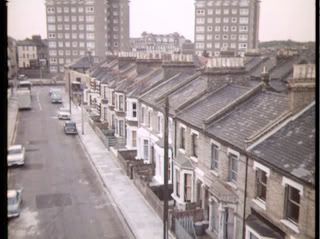 References: Richard Webber, Dick Clement & Ian La Frenais, 2002: Porridge: The Complete Scripts and Series Guide. London: Hodder Headline Wickham, Phil, 2008: BFI TV Classics: ‘The Likely Lads’. London: British Film Institute For more information, please visit the homepage of Network DVD
|
|||||

|